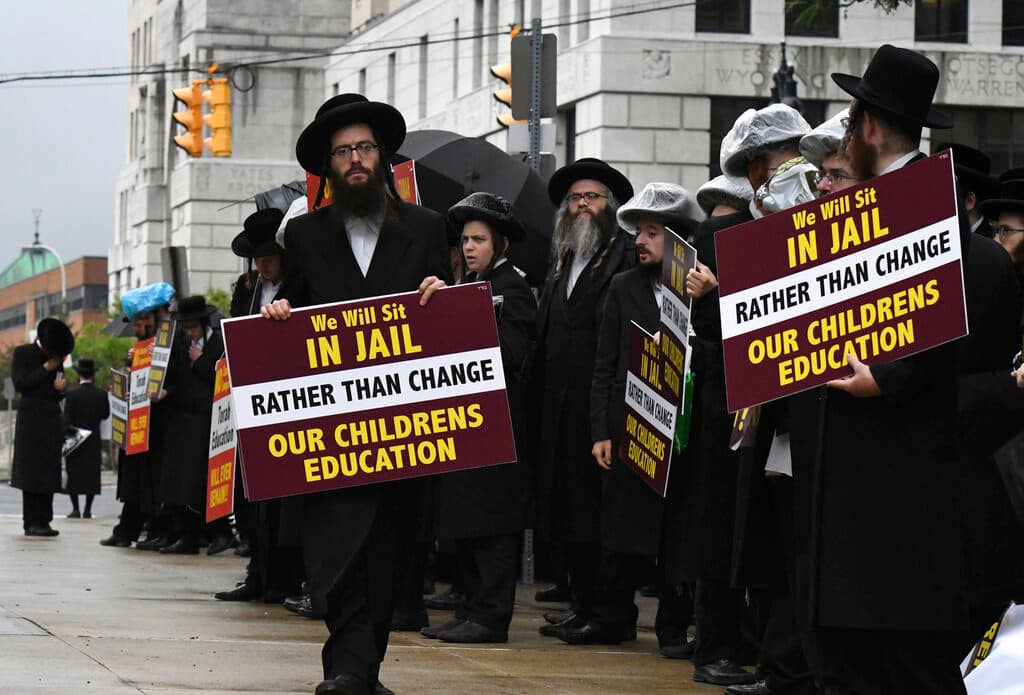‘Invasive Secular Oversight’ Is the Complaint Against New York as State Tries To Minimize Autonomy of Jewish Day Schools
Lawsuit is levied in state court in an effort to protect religious free exercise rights of yeshivas at the heart of Orthodox community.

New York’s burgeoning orthodox community is fighting back against an “invasive secular oversight,” as state regulators seek to minimize the autonomy of the educational institutions that lie at the community’s heart.
It has been a whirlwind season for New York’s embattled yeshivas as they’ve faced new regulations that seek to dictate the substance of their classroom instruction, even while under scrutiny following a lengthy New York Times expose and the conclusion of an investigation from New York City’s Department of Education.
The pressure is mounting for the Orthodox Jewish institutions of learning to abandon their core religious commitments and devote more instructional time to secular subjects. The yeshivas, however, are fighting back with a lawsuit against the New York State education department, filed by several schools and Jewish advocacy groups, including the Agudath Israel of America.
The suit, filed in state supreme court, argues that new regulations violate the Jewish community’s First Amendment rights. The suit alleges that the regulations constitute an “invasive secular oversight” that threatens to “hamper and interfere with religious education.”
Under the new regulations, approved in September, local school districts will determine whether yeshivas are meeting the standards of “substantial equivalence” to their public counterparts.
According to pre-existing state law, nonpublic schools must provide an education that is “substantially equivalent” to what students would receive in local public schools, but the measure of substantial equivalence was more ambiguous. Now, superintendents must perform regular reviews of yeshivas in their district and evaluate the schools for instruction of more than 20 academic subjects in English.
Schools that fail review will be shut down, and parents who continue to send their children to the shuttered institutions could face jail time.
“What triggered these regulations was not a change in the law or any educational development, but rather the convergence of the nanny state and the secular state,” the lawyer for the plaintiffs, Avi Schick, told the Sun. “The result is a government that doesn’t see value in religious education and is not inclined to let parents decide what is best for their children.”
More than 170,000 students — comprising nearly half of the Empire State’s nonpublic school students — attend yeshivas and Jewish day schools in New York. “The yeshiva education system is indispensable to the continuity and growth of the Jewish community in New York and around the country,” the suit reads. For Orthodox Jews, the yeshivas are “the primary vehicle for imparting Jewish ethical, moral and religious obligations to children.”
The suit argues that the new regulations are illegal on procedural grounds. The plaintiffs argue that the required public comment period was a “sham.” The Regents, the suit says, did not consider the more than 350,000 comments submitted in response — “the overwhelming majority” of which, it claims, were negative.
The suit claims that the regulations violate New York’s state constitution by turning the state’s education department into a “de facto licensing regime,” a power the state Supreme Court ruled it did not have in 1948.
The suit also alleges that the regulations “single out yeshivas” over other nonpublic schools “for a more invasive, heightened review.” The plaintiffs argue that the 20-subject review imposes a “more onerous” standard than that of substantial equivalence. The suit decries such standards as “arbitrary, capricious, and in violation of law.”
Most private schools would be exempt from the review process by virtue of their accreditation status or administration of the state’s Regents examination. Yeshivas, however, would not.
The suit is not the first time these petitioners, represented by Mr. Schick, have banded together. In 2019, they sued the Board of Regents over proposed regulations in state courts and emerged victorious. The regulations were struck down on procedural grounds.
A prominent orthodox rabbi, Nosson Scherman, the general editor at the largest Orthodox publishing house in America, praised Mr. Schick, saying he “is not only defending the rights of parents and a religious community. He is defending the First Amendment.”

